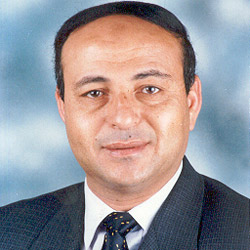CAIRO: The second annual Egypt Insurance Conference organized by Euromoney echoed with the refrain, “Egypt’s insurance industry has made huge progress, yet much remains to be done.” But spouting figures on the growth rates of Egyptian insurance penetration offers little insight into how Egypt compares to other countries.
Chris Parsons, professor of insurance at Sir John Cass Business School in London, gave a presentation on the general tendencies of young insurance markets, then joined a question and answer session featuring Jean Sebastien Dietsch, head of the insurance sector for BNP Paribas, and Guy Horton, the managing director for the Commercial International Life Insurance Company (CIL).
Parsons explained that insurance penetration generally follows an S-curve, with initial demand increasing slowly until a critical mass is reached, at which point demand spikes and eventually slows.
“In general, people in developing countries don’t trust insurers,” he smiled, but that increasing wealth leads them to seek greater protection for their property.
Initial demand for insurance usually involves the desire to insure vehicles, then as the population becomes wealthier, property insurance becomes popular. In more mature markets, focus shifts to the individual: life insurance, health insurance and disability coverage.
On the national level, “in developing markets the highest demand is for large national projects. Later insurance related to trade and transport, then small businesses that look to protect their cash flow, such as liability, workers’ compensation. Then another shift to insure financial assets, specialized liability lines, environmental liability, etc.,” he clarified.
Expressing admiration for Egypt’s 11 percent growth in the insurance sector in 2008, Parsons joked that if the rate remains steady Egypt will overtake the UK in 22 years, the country with the third highest level of insurance penetration, (Taiwan is number one).
He then deconstructed underlying reasons for the success or failure of insurance companies. “Lloyd’s, a venerable UK insurance firm, weathered the financial crisis well by focusing on traditional insurance products, maintaining conservative fiscal policies such as insisting on cash-backed deposits, and limiting exposure to the equities markets.”
On the other hand, “inadequate pricing or loss of reserves, or too rapid growth — they often occur simultaneously — represent …the road to damnation,” he warned.
“Life insurance suffered in the crisis. On the asset side, they were weighed down with risky investments. AIG, Swiss Re, the financial guarantee insurers [what he termed US Monoliners] had moved from traditional insurance to risky structured finance. Coupled with failures in regulation, the crisis hit hard.”
“Bancassurance operators suffered as well, such as ING, which was carved up by the European Commission as the price for receiving government support.” He pointed out that it was the banking side of bancassurers that caused trouble, the providing insurance, while carrying some inherent risk, is not a systemically risky endeavor.
To counter this, he advised, “Know your customers, develop the right products at the right time… set prices for profit not growth, do not take unnecessary risks, invest in training your people.”
He finished by pointing out that Thailand has a similar income profile to Egypt but insurance penetration is three times higher. He attributed this to Thailand’s higher financial literacy and greater presence of banks, even in rural areas. “Insurance develops together with banking and finance and mortgages,” he continued.
Risk factors
Asked to speak from his experience of the insurance industry in other developing markets, Horton of CIL laughed, “Don’t do derivatives and create systemic instability.”
Dietsch of BNP Paribas expanded, “Consumer protection characterizes a mature market, but in this environment, what we think should also be improved is the right product for the right level of education, targeting the right level of people.”
An audience member asked how to raise Egypt’s profile in the global insurance sector. Horton replied, “It comes down to actions, not to awareness or publicity. A company that is not currently present here told me, ‘We know Egypt but it’s not on our radar.’ I gave them information and they answered, ‘We’re not sure why we weren’t aware of Egypt before, but we’ll pay attention now.”
He explained the generalized “bill-board” approach to advertising had less effect than approaching people and companies who would directly benefit.
Another question raised the concern of insurance as inherently risky, or only when insurance companies engage in less secure practices.
Parsons answered, “No, the Geneva Association just published a paper that concluded that these element of risk arise from the recent practice of banks and insurers playing in each others markets,” especially the large bancassurance companies that revealed millions in bad assets during the financial crisis.
The insurance conference concluded with an interview of Investment Minister Mohieldin by Abd El Monem El Said, the chairman of state-run newspaper Al-Ahram.
Veering from the subject of insurance, Mohieldin reaffirmed the government’s commitment to large-scale investment projects, with $35 to 40 million budgeted for such works in the coming year.
Returning to investment and the reluctance of ordinary Egyptians to purchase policies, audiences brought up the role of the media and government to better publicize the need for insurance.
Suggestions of awareness campaigns organized through schools aroused both support and antagonism. Mohieldin responded, “The media and the culture of reform are all related to awareness… The government should not interfere with media whatsoever,” regarding awareness campaigns, and that in terms of changing opinions about insurance, “the Ministry of Investment has a role.”
